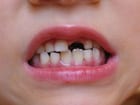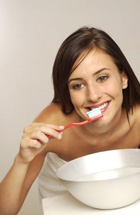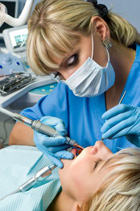 If you happen to get canker sores, you will know the pain and irritation they can cause, but where they come from and what causes them is still a bit of a mystery, claims a dentist in central Leeds. They tend to erupt inside the mouth- on the inside of the lips, gums and on the tongue and can be confused with toothache. Although not contagious, it is widely agreed that they are handed down in the family through generations and are more common in women. There are three main types of canker sores. The most common is the minor sore, which is small and lasts for around 8 days. The major sore is a lot larger and more painful and can hang around in the mouth for almost a month. Herpetiform ulcers appear in clusters and they also last around 8 days. They start as a gentle swelling but erupt quickly and because they are difficult to treat, they can cause great discomfort until they disappear. Though the causes of these sores are a bit of a grey area, they can be linked to the same reasons why other problems affect the mouth- vitamin deficiency, poor diet, stress, poor dental hygiene, a weak immune system, hormone imbalance (as in pregnancy), smoking and drinking. Treating them is also a grey area, there are canker related medications that tend to soothe rather than cure. As with cold sores, they seemingly come and go at there own leisure, but a dentist will be able to offer advice on treating them.
If you happen to get canker sores, you will know the pain and irritation they can cause, but where they come from and what causes them is still a bit of a mystery, claims a dentist in central Leeds. They tend to erupt inside the mouth- on the inside of the lips, gums and on the tongue and can be confused with toothache. Although not contagious, it is widely agreed that they are handed down in the family through generations and are more common in women. There are three main types of canker sores. The most common is the minor sore, which is small and lasts for around 8 days. The major sore is a lot larger and more painful and can hang around in the mouth for almost a month. Herpetiform ulcers appear in clusters and they also last around 8 days. They start as a gentle swelling but erupt quickly and because they are difficult to treat, they can cause great discomfort until they disappear. Though the causes of these sores are a bit of a grey area, they can be linked to the same reasons why other problems affect the mouth- vitamin deficiency, poor diet, stress, poor dental hygiene, a weak immune system, hormone imbalance (as in pregnancy), smoking and drinking. Treating them is also a grey area, there are canker related medications that tend to soothe rather than cure. As with cold sores, they seemingly come and go at there own leisure, but a dentist will be able to offer advice on treating them.





 For some reason, the evil legend that is the root canal still tends to strike fear into its prey and once the victim has had the excruciating treatment, pain ensues for months. Sound familiar- well it does to most dentists in the city of Leeds! In all reality, a simple look on the internet could dispel any myths that surround the procedure. The reason for having a root canal stems from bad oral hygiene, allowing plaque to develop and form cavities. If the tooth is to be saved, then the cavity must be cleared of decay, the roots removed and the gap that’s left filled. In times gone by, the tooth would have been ‘pulled’ and here lies one of the myths that surround root canals. If a tooth is causing pain, an extraction is not only considered to be less painful, but cheaper too (the truth is, a root canal is no more painful than a filling). But removing a tooth (when it needn’t be) leads to all sorts of problems. The surrounding teeth can suffer trauma, start to move and become loose, leading to gum disease and infection. Another myth that stems out of this treatment is based on other people’s experiences, like that of your parent’s in the bad old days, “my god! This is what I’m in for!” If in this modern world, you still listen to gossip, believe in fairies, monsters and death by root canal, maybe a little research and a consultation with your dentist will dispel such myths, allowing you to sleep at night with the light out and get out more.
For some reason, the evil legend that is the root canal still tends to strike fear into its prey and once the victim has had the excruciating treatment, pain ensues for months. Sound familiar- well it does to most dentists in the city of Leeds! In all reality, a simple look on the internet could dispel any myths that surround the procedure. The reason for having a root canal stems from bad oral hygiene, allowing plaque to develop and form cavities. If the tooth is to be saved, then the cavity must be cleared of decay, the roots removed and the gap that’s left filled. In times gone by, the tooth would have been ‘pulled’ and here lies one of the myths that surround root canals. If a tooth is causing pain, an extraction is not only considered to be less painful, but cheaper too (the truth is, a root canal is no more painful than a filling). But removing a tooth (when it needn’t be) leads to all sorts of problems. The surrounding teeth can suffer trauma, start to move and become loose, leading to gum disease and infection. Another myth that stems out of this treatment is based on other people’s experiences, like that of your parent’s in the bad old days, “my god! This is what I’m in for!” If in this modern world, you still listen to gossip, believe in fairies, monsters and death by root canal, maybe a little research and a consultation with your dentist will dispel such myths, allowing you to sleep at night with the light out and get out more. Unless you are planning on a lifetime role as a witch in Macbeth, decaying teeth are not only unsightly, but they can give rise to serious health problems, according to a dentist from central Leeds. Children are prone to tooth decay, as teeth grow and new ones come through and where plaque is allowed to form. The problems usually start with bad oral hygiene- the lack of brushing, bad diet, smoking and heavy drinking, which is why a bi-annual visit to the dentist is important in countering any signs of decay. Plaque is the catalyst for tooth decay. This can be removed by brushing and flossing, but if allowed to build up, it will turn to tartar, from which cavities or caries start to form. It doesn’t happen overnight; it can take months, even years for the problem to arise, but when it does, it has a knock-on affect. Infection can set in leading to gum disease, periodontivis and eventually, tooth loss. Spotting it early on is important and an x-ray or radiograph will pick up any signs of a cavity forming. Depending how advanced the problem is, treatment will be required immediately to remove any decay from the teeth in order to save them. This is done by a root canal that removes any dead tissues and roots from the tooth and then filled- sometimes capped.
Unless you are planning on a lifetime role as a witch in Macbeth, decaying teeth are not only unsightly, but they can give rise to serious health problems, according to a dentist from central Leeds. Children are prone to tooth decay, as teeth grow and new ones come through and where plaque is allowed to form. The problems usually start with bad oral hygiene- the lack of brushing, bad diet, smoking and heavy drinking, which is why a bi-annual visit to the dentist is important in countering any signs of decay. Plaque is the catalyst for tooth decay. This can be removed by brushing and flossing, but if allowed to build up, it will turn to tartar, from which cavities or caries start to form. It doesn’t happen overnight; it can take months, even years for the problem to arise, but when it does, it has a knock-on affect. Infection can set in leading to gum disease, periodontivis and eventually, tooth loss. Spotting it early on is important and an x-ray or radiograph will pick up any signs of a cavity forming. Depending how advanced the problem is, treatment will be required immediately to remove any decay from the teeth in order to save them. This is done by a root canal that removes any dead tissues and roots from the tooth and then filled- sometimes capped. Angle orthodontics is a specialised study of dentistry that is based on the theories of the founder of orthodontics, Edward Angle. Much of his work is centred on the maintenance of the occlusion, or the ‘bite’. If the bite is misaligned, this can give rise to all manner of complications in the head and upper body- tooth decay, gum disease, wear on the jaw, leading to head, eyes and earache, neck and upper back problems. As a dentist in the city of Leeds points out, orthodontics focuses on rectifying these problems from childhood, by using braces to straighten teeth and bringing the occlusion into line, hence correcting over, upper and cross biting. Braces have come a long way since Angles’ day, though the principles remain. Traditional braces never had the luxury of the use of computers. Modern methods like Invasalign and Inman braces are starting to revolutionise teeth straightening, making the treatment quicker. As we get older, our teeth start to move, wear, crack, even fall out and this affects the alignment of the occlusion. The use of implants, bridges, dentures and crowns can ensure that no extra pressure is put on the bite. Bruxism or teeth grinding is another offender and needs to be addressed immediately as does gum disease, to avoid tooth decay.
Angle orthodontics is a specialised study of dentistry that is based on the theories of the founder of orthodontics, Edward Angle. Much of his work is centred on the maintenance of the occlusion, or the ‘bite’. If the bite is misaligned, this can give rise to all manner of complications in the head and upper body- tooth decay, gum disease, wear on the jaw, leading to head, eyes and earache, neck and upper back problems. As a dentist in the city of Leeds points out, orthodontics focuses on rectifying these problems from childhood, by using braces to straighten teeth and bringing the occlusion into line, hence correcting over, upper and cross biting. Braces have come a long way since Angles’ day, though the principles remain. Traditional braces never had the luxury of the use of computers. Modern methods like Invasalign and Inman braces are starting to revolutionise teeth straightening, making the treatment quicker. As we get older, our teeth start to move, wear, crack, even fall out and this affects the alignment of the occlusion. The use of implants, bridges, dentures and crowns can ensure that no extra pressure is put on the bite. Bruxism or teeth grinding is another offender and needs to be addressed immediately as does gum disease, to avoid tooth decay. Children can be very cruel at times and the playground, a very hard place to grow up- especially if you have ‘wonky’ teeth and have to fill your mouth with wires. However, help is at hand in the shape of lingual braces, says a dentist in central Leeds. Braces are traditionally fitted to the outside of the teeth and are fairly cheap because, within reason, one size fits all, making them easy to produce. But lingual braces are fitted to the inside, making them barely visible and save you the psychological trauma of playtime scorn. They work in the same way as other braces- pulling and twisting the teeth into shape and aligning a malocclusion or ‘bad bite’. Once you have decided on this treatment, moulds will be taken so that the brackets can be made to fit your mouth. The brackets will return in a plastic applicator, filled with cement and fitted into place. As the cement hardens, the applicator will break off. Then wire will be threaded through the brackets and fixed and the treatment will begin. It can take a few weeks to become accustomed to them being in your mouth- there may be swelling and soreness at first and your speech may be impaired, but these will disappear. There is also constant monitoring of the process. Every 6 weeks, you will have a check up for infection and the braces will be cleaned. But with lingual braces treatment is lengthy- up to 3 years and they aren’t cheap because they are individually crafted for you- around £4000. That’s the price for avoiding ridicule!
Children can be very cruel at times and the playground, a very hard place to grow up- especially if you have ‘wonky’ teeth and have to fill your mouth with wires. However, help is at hand in the shape of lingual braces, says a dentist in central Leeds. Braces are traditionally fitted to the outside of the teeth and are fairly cheap because, within reason, one size fits all, making them easy to produce. But lingual braces are fitted to the inside, making them barely visible and save you the psychological trauma of playtime scorn. They work in the same way as other braces- pulling and twisting the teeth into shape and aligning a malocclusion or ‘bad bite’. Once you have decided on this treatment, moulds will be taken so that the brackets can be made to fit your mouth. The brackets will return in a plastic applicator, filled with cement and fitted into place. As the cement hardens, the applicator will break off. Then wire will be threaded through the brackets and fixed and the treatment will begin. It can take a few weeks to become accustomed to them being in your mouth- there may be swelling and soreness at first and your speech may be impaired, but these will disappear. There is also constant monitoring of the process. Every 6 weeks, you will have a check up for infection and the braces will be cleaned. But with lingual braces treatment is lengthy- up to 3 years and they aren’t cheap because they are individually crafted for you- around £4000. That’s the price for avoiding ridicule! According to a dentist in Leeds, there is no precise science to brushing you teeth correctly. Each mouth is unique and has different requirements and there are so many factors to consider before you even put the brush into your mouth. Gums and teeth may react differently to soft and hard brushes- small, large and angled heads and let’s not forget the electric choice. Then there’s the subject of toothpastes; these too come in different guises. Some may be suited for sensitive teeth, some have whitening properties, but all should come recommended. Finding the brush and paste that suits you is down to experimenting, but consulting with your dentist will make your choices easier. When we finally arrive at the brushing stage, it is generally considered that you should start at the front of the mouth on the inside and work towards the back, bringing the brush off the gums- the same procedure is applied on the outside. In the case of electric brushes, the work is done for you. There are many to choose from and again it’s down to personal choice, but in time, you will find what’s good for you- it’s a matter of ‘horses for courses’. To ensure success through brushing, flossing and rinsing are a natural support for the best results.
According to a dentist in Leeds, there is no precise science to brushing you teeth correctly. Each mouth is unique and has different requirements and there are so many factors to consider before you even put the brush into your mouth. Gums and teeth may react differently to soft and hard brushes- small, large and angled heads and let’s not forget the electric choice. Then there’s the subject of toothpastes; these too come in different guises. Some may be suited for sensitive teeth, some have whitening properties, but all should come recommended. Finding the brush and paste that suits you is down to experimenting, but consulting with your dentist will make your choices easier. When we finally arrive at the brushing stage, it is generally considered that you should start at the front of the mouth on the inside and work towards the back, bringing the brush off the gums- the same procedure is applied on the outside. In the case of electric brushes, the work is done for you. There are many to choose from and again it’s down to personal choice, but in time, you will find what’s good for you- it’s a matter of ‘horses for courses’. To ensure success through brushing, flossing and rinsing are a natural support for the best results. There is no doubt that our teeth take a battering over time. They can wear, crack, discolour or even suffer from decay. According to a dentist in central Leeds, this is the time to take action to prevent further complications. If you have regular visits to the dentist, most of these problems will be spotted and a course of action decided upon. In some cases, crowns may be recommended; they cover an existing tooth that has been damaged or can be fitted to an implant. If a cavity has formed through poor oral hygiene, a root canal may be needed to save the tooth after which, a crown can be fitted to restore the look and strength. Crowns may also be recommended in the case of cracking or wear. The procedure is a fairly painless. You will be put under a local anaesthetic and the tooth shaped to accommodate the new tooth and moulds will be taken of the mouth so that a crown can be made that perfectly fits the tooth and mouth. This will take a couple of weeks, so you will be fitted a temporary crown during this time. When it arrives, the crown will be bonded into place with dental cement. For the vain amongst us with money to burn, crowns can be made from various materials. Porcelain or ceramic are the natural choice, though crowns can be moulded in gold. They are durable, lasting up to 15 years and costs vary, depending on your choice, but can start anywhere from £150.
There is no doubt that our teeth take a battering over time. They can wear, crack, discolour or even suffer from decay. According to a dentist in central Leeds, this is the time to take action to prevent further complications. If you have regular visits to the dentist, most of these problems will be spotted and a course of action decided upon. In some cases, crowns may be recommended; they cover an existing tooth that has been damaged or can be fitted to an implant. If a cavity has formed through poor oral hygiene, a root canal may be needed to save the tooth after which, a crown can be fitted to restore the look and strength. Crowns may also be recommended in the case of cracking or wear. The procedure is a fairly painless. You will be put under a local anaesthetic and the tooth shaped to accommodate the new tooth and moulds will be taken of the mouth so that a crown can be made that perfectly fits the tooth and mouth. This will take a couple of weeks, so you will be fitted a temporary crown during this time. When it arrives, the crown will be bonded into place with dental cement. For the vain amongst us with money to burn, crowns can be made from various materials. Porcelain or ceramic are the natural choice, though crowns can be moulded in gold. They are durable, lasting up to 15 years and costs vary, depending on your choice, but can start anywhere from £150. Recovering from a trauma to the mouth takes time and care- observes a dentist in the city of Leeds. It can leave psychological scars as well as physical ones and the practise of maxillofacial surgery is designed to relieve the physical issues by surgery to the mouth, jaw, head and neck that are results of disease, injury or congenital conditions- procedures that correct normal occlusion (bite) issues that cannot be treated by braces. The surgery can be complex and both an othodontist and a maxillofacial surgeon will collaborate at the planning stage. X-rays and photographs will be used in designing computer generated images, predicting the shape of the face post operation. During the operation, both jaws may be operated on. Bones will be cut and adjusted and then secrewed back together to re-construct the shape of the face. This can normally be achieved from inside the mouth, but once the treatment is finished, it is the job of the orthodontist to over-see the rewiring of the jaw and the use of retainers and braces to ensure that the occlusion is correct. The recovery period can be lengthy depending on the complexity of the operation- anything from a few weeks to a year. The patient will need constant monitoring at first to check for infection and healing and will be put on an all-liquid diet, an important factor to the healing process. As the mouth heals, solids foods will be introduced into the diet. Once the healing process is complete and the braces and wiring removed, the patient can then think about restoring their look through more standard othodontic practices and cosmetic dentistry.
Recovering from a trauma to the mouth takes time and care- observes a dentist in the city of Leeds. It can leave psychological scars as well as physical ones and the practise of maxillofacial surgery is designed to relieve the physical issues by surgery to the mouth, jaw, head and neck that are results of disease, injury or congenital conditions- procedures that correct normal occlusion (bite) issues that cannot be treated by braces. The surgery can be complex and both an othodontist and a maxillofacial surgeon will collaborate at the planning stage. X-rays and photographs will be used in designing computer generated images, predicting the shape of the face post operation. During the operation, both jaws may be operated on. Bones will be cut and adjusted and then secrewed back together to re-construct the shape of the face. This can normally be achieved from inside the mouth, but once the treatment is finished, it is the job of the orthodontist to over-see the rewiring of the jaw and the use of retainers and braces to ensure that the occlusion is correct. The recovery period can be lengthy depending on the complexity of the operation- anything from a few weeks to a year. The patient will need constant monitoring at first to check for infection and healing and will be put on an all-liquid diet, an important factor to the healing process. As the mouth heals, solids foods will be introduced into the diet. Once the healing process is complete and the braces and wiring removed, the patient can then think about restoring their look through more standard othodontic practices and cosmetic dentistry. It is important to find good, professional dental care in the UK to maintain oral health, but maintaining good, healthy teeth also relies on good oral hygiene in the home, according to a dentist based in the city of Leeds. Choosing a dentist that suits you, is paramount. You must feel comfortable with the service offered, so it is vital that you shop around. The best way is to ask friends, neighbours or work colleagues where they get their teeth done and then set up a consultation so that you can get a feel of the surgery. This will make attending appointments a lot less daunting. It’s also important that the dentist has the facilities to cover a range of dental treatments that you require. Regular visits should prevent any major complications and your dentist should be able to rectify any problems should they arise and offer you a range of treatments- cosmetic procedures, implants, bridges, cavaties, combat gum disease and administer emergency surgery. But your dentist is also there to offer you advice on caring for your teeth outside of the practise- how and when to clean your teeth, what brush and toothpaste to use that suits you, flossing correctly and foods that will promote strong teeth. They will also offer advice on what to avoid- whether you choose to heed that advice is up to you, but it’s comforting to know that your dentist is on hand to correct your indulgences!
It is important to find good, professional dental care in the UK to maintain oral health, but maintaining good, healthy teeth also relies on good oral hygiene in the home, according to a dentist based in the city of Leeds. Choosing a dentist that suits you, is paramount. You must feel comfortable with the service offered, so it is vital that you shop around. The best way is to ask friends, neighbours or work colleagues where they get their teeth done and then set up a consultation so that you can get a feel of the surgery. This will make attending appointments a lot less daunting. It’s also important that the dentist has the facilities to cover a range of dental treatments that you require. Regular visits should prevent any major complications and your dentist should be able to rectify any problems should they arise and offer you a range of treatments- cosmetic procedures, implants, bridges, cavaties, combat gum disease and administer emergency surgery. But your dentist is also there to offer you advice on caring for your teeth outside of the practise- how and when to clean your teeth, what brush and toothpaste to use that suits you, flossing correctly and foods that will promote strong teeth. They will also offer advice on what to avoid- whether you choose to heed that advice is up to you, but it’s comforting to know that your dentist is on hand to correct your indulgences! Fashion impacts on us in all walks of life, especially on celluloid, where we are constantly being exposed to celebrities who are currently ‘hot’ and those who will do anything to fend off the onslaught of age in an attempt to remain at least, luke-warm. Such trends impact on our mouths too and dentistry seeks the answers, as it pursues ‘the perfect smile’. Well, good news folks, it’s here and available, according to a dentist in Leeds. Aesthetic dentistry is the ‘must have’ right now and there are several ways to get it. Bleaching is the cheapest right now, through the use of home kits or by intense light treatment at the dentists. White fillings will give back a natural mouth as opposed to the more common silver ones. Dental bridges and implants can replace missing teeth, to give back a full smile, as well as combating gum disease. But the most popular cosmetic treatment is veneers. These can restore teeth to their former glory. They can cover up cracks, stains, plug gaps and give the teeth extra length which can be shaped and contoured. Vanity aside though and at a deeper level, restoring the aesthetic look is important to those who have oral problems due to trauma or surgery. Not only is there a physical answer to oral disfigurement, but in turn, a psychological one too. And at what cost is it, to look good and feel great? Priceless!
Fashion impacts on us in all walks of life, especially on celluloid, where we are constantly being exposed to celebrities who are currently ‘hot’ and those who will do anything to fend off the onslaught of age in an attempt to remain at least, luke-warm. Such trends impact on our mouths too and dentistry seeks the answers, as it pursues ‘the perfect smile’. Well, good news folks, it’s here and available, according to a dentist in Leeds. Aesthetic dentistry is the ‘must have’ right now and there are several ways to get it. Bleaching is the cheapest right now, through the use of home kits or by intense light treatment at the dentists. White fillings will give back a natural mouth as opposed to the more common silver ones. Dental bridges and implants can replace missing teeth, to give back a full smile, as well as combating gum disease. But the most popular cosmetic treatment is veneers. These can restore teeth to their former glory. They can cover up cracks, stains, plug gaps and give the teeth extra length which can be shaped and contoured. Vanity aside though and at a deeper level, restoring the aesthetic look is important to those who have oral problems due to trauma or surgery. Not only is there a physical answer to oral disfigurement, but in turn, a psychological one too. And at what cost is it, to look good and feel great? Priceless!

